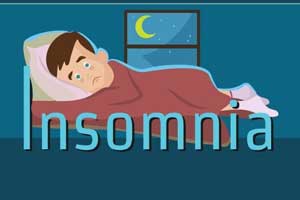- Home
- Editorial
- News
- Practice Guidelines
- Anesthesiology Guidelines
- Cancer Guidelines
- Cardiac Sciences Guidelines
- Critical Care Guidelines
- Dentistry Guidelines
- Dermatology Guidelines
- Diabetes and Endo Guidelines
- Diagnostics Guidelines
- ENT Guidelines
- Featured Practice Guidelines
- Gastroenterology Guidelines
- Geriatrics Guidelines
- Medicine Guidelines
- Nephrology Guidelines
- Neurosciences Guidelines
- Obs and Gynae Guidelines
- Ophthalmology Guidelines
- Orthopaedics Guidelines
- Paediatrics Guidelines
- Psychiatry Guidelines
- Pulmonology Guidelines
- Radiology Guidelines
- Surgery Guidelines
- Urology Guidelines
Stroke patients may experience sustained insomnia problems

For the study, the researchers conducted an in-depth sleep laboratory experiment to compare the brain signals of patients in the chronic state (at least one-year post-stroke) and the general population.
Key Findings:
- Using a polysomnogram (PSG) test, which assesses the brains' sleeping patterns over two nights, researchers found that it took stroke patients longer to fall asleep and that they had poorer sleep efficiency - the ratio of time spent asleep compared to the time spent in bed - than those who had not experienced a stroke.
- A multiple sleep latency test (MSLT), also showed that stroke patients were less likely to nap or fall asleep during the day to compensate for lost sleep at night.
- The stroke patients were more prone to errors in a vigilance test than their counterparts, increasing their risk of cognitive failures or falls.
- Although sleep efficiency was reduced in patients, total sleep time between the groups was similar, suggesting that lesions in the brains' centers for sleep-wake regulation are unlikely to cause insomnia.
- Sleep problems experienced by stroke patients are due to a number of contributory factors, such as greater psychological strain, pain, and discomfort as well as reduced levels of physical activity.
"Our research shows that those who have suffered from stroke maintain difficulties with their sleep which is likely to affect the overall recovery and quality of life. The importance of sleep in aiding the recovery of patients should not be underestimated in helping to improve and maintain physical and mental well-being," said Dr. Sterr.
"The present study provides evidence for an insomnia-like sleep disorder in the chronic phase of stroke. Given the importance of sleep for daytime function, psychological well-being, and health, as well as the proposed role in neurorehabilitation, our findings highlight the need to encapsulate sleep in stroke care provision. The pathomechanisms proposed here may not only be relevant to stroke but also other chronic medical conditions," concluded the authors.
For further details click on the link: https://doi.org/10.1038/s41598-018-26630-y

Disclaimer: This site is primarily intended for healthcare professionals. Any content/information on this website does not replace the advice of medical and/or health professionals and should not be construed as medical/diagnostic advice/endorsement or prescription. Use of this site is subject to our terms of use, privacy policy, advertisement policy. © 2020 Minerva Medical Treatment Pvt Ltd